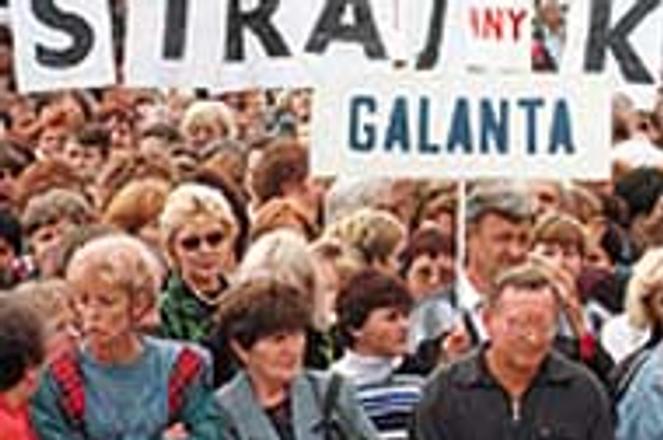A September 2 teachers protest in Bratislava brought together thousands of disaffected pedagogues.photo: TASR
Blasting their low salaries and a round of recent layoffs, educational employees opened the new school year on September 2 with protests in Slovakia's three main cities - Bratislava, Banská Bystrica and Košice. The protesting teachers threatened to strike if the government did not meet their demands.
"Ten years ago, a general strike forced the communist government to leave," a teacher from the elementary school in Stupava called out at the Bratislava rally. "Now we should do the same thing. Words mean nothing, we have to go on strike," he shouted, winning the applause of his fellow teachers.
Officially, the Teachers and Scientists Union is asking for a wage increase of five percent as of October 1 this year. Currently, wages for teachers, which start at about 7,000 Slovak crowns ($167) per month, are among the lowest for Slovak state employees. The teachers also protested the recent lay-offs of 10% of the system's non-teaching employees, such as school administrators and janitors. According to state plans, 8,000 teachers will lose their jobs next year.
Education Minister Milan Ftáčnik said he viewed a strike as an extreme and unwarranted measure. " I don't see any reason for a strike," he told The Slovak Spectator on September 8. "But it's up to the teachers."
The protest in Bratislava was supported by the presence of Labour Union Confederation (KOZ) chairman Ivan Saktor, who backed up the teachers' demands with the promise that KOZ union members would not give an inch in the fight for labour rights. He invited the teachers to a general union protest sponsored by the KOZ and planned for September 25 in Bratislava.
Wage increase options
Ftáčnik said that while an immediate hike in wages for teachers was impossible, he would consider adding an extra month's salary to the pay packets of school and hospital employees. But he warned the money would only be available if the government's other financial deals came through.
"Paying that [the extra wages] depends on [the success of] negotiations with the Czech Republic about selling the Slovak share in Československá obchodná banka [ČSOB]. That's something I can't influence," Ftáčnik said.
Even if teachers were given an extra month's salary, however, their average income would still be below the average industrial wage, which now hovers around 11,000 crowns a month.
In 1995, two months of additional salary would have been needed to bring teachers up to the Slovak average wage; in 1999, three additional months' wages will be required, said Milan Vachula, deputy chairman of the Teachers and Scientists Union. Vachula added that a strike was still a real option, and said that the union was prepared to take such action. More will be decided at the general Bratislava union protest on September 25, he said.
Another teachers organisation, the Slovak Teachers Forum, has suggested that schools be turned into autonomous institutions which receive state support on the basis of the number of students that attend them.
According to this plan, money from the Education Ministry budget would be issued to parents in the form of 'education cheques' bearing a face value of 20,000 crowns per student. Parents would hand over the cheques to the schools their children attended, while the director of each school would allocate this money to staff and materiel needs in co-operation with a school council.
But Ftáčnik dismissed this plan as "a fantasy." "The cost of education in a regular high school is simply not equal to that in a special secondary school needing a lot of special equipment. No European country runs on this model," he stated.
The Education Ministry is currently preparing a new education law which should guarantee more autonomy to schools and a more equitable formula by which money would be transferred from state budgets to schools. Ftáčnik said the law may be passed before the end of this calendar year or at the beginning of next year.
At the September 2 protest meeting in Banská Bystrica, Prime Minister Mikuláš Dzurinda called on teachers to be patient until next autumn, citing both the upcoming law and the need to make sacrifices to improve the country's financial situation.
"First we have to balance the macro-economy. Then you will also see an improvement in your financial situation. We can't stop halfway [in our programme to heal the economy] and increase wages in the public sector," Dzurinda said.
One hundred and seventy thousand people currently work in the Slovak educational system, which serves 1.1 million students, 20% of the Slovak population.


